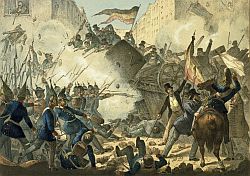Roots of parliamentarianism
18 May 1848: First all-German parliament
The conditions for the emergence of a parliamentary democracy in Germany could hardly have been worse in the 19th century - the country was divided into a large number of independent states.
There was, however, no holding back the aspirations to political freedom and national independence - under the pressure of bourgeois revolutionary uprisings influenced by the democratic upheavals in France, constituent assemblies were permitted by the German princes in 1848 and an electoral law was adopted. A National Assembly was elected and met for the first time at St. Paul’s Church in Frankfurt on 18 May.
This was the first all-German parliament. Its most significant achievement was the adoption of The Fundamental Rights of the German People, which was subsequently included in the constitution. However, the efforts to unify Germany failed. In addition, the competencies of the parliament and popular voting rights were increasingly restricted.
11 August 1919: Germany’s first parliamentary democracy
Parliamentary democracy was not developed further in the German Empire. Rather, under Bismarck a constitutional monarchy was established, in which the Emperor and Imperial Chancellor were able to govern largely free of interference from the Reichstag (Imperial Diet).
Only after the end of the First World War was the monarchy finally swept away. This opened up the way to parliamentary government and a new constitution: the Weimar Constitution was adopted on 11 August 1919. This made the Reichstag the principal constitutional organ of the legislative.
1933-1945: Parliament stripped of power
The darkest chapter in German history began with Hitler’s appointment as Chancellor. Parliamentary democracy was replaced by a totalitarian state in which one party exercised dictatorial rule.
The National Socialists succeeded in having the "Enabling Act", with which Parliament suspended its own rights, adopted in the Reichstag by making massive threats and terrorising its Members.
Parties, trade unions and all social organisations were either forced into ideological conformity or banned. Parliamentarians who opposed the regime were persecuted, arrested and murdered. The National Socialists made the Reichstag an assembly of uniformed supernumeraries who cheered Hitler’s speeches and were intended to give foreigners the impression that his dictatorship enjoyed parliamentary legitimation.
7 September 1949: First sitting of the German Bundestag
Following the collapse of the National Socialist dictatorship and the end of the Second World War, the occupying powers began to license parties and trade unions again in the summer of 1945.
In 1948, the "Parliamentary Council" assembled in Bonn on the basis of a decision of the Western occupying powers and the West German Länder. On 8 May 1949, the Parliamentary Council adopted the Basic Law, making it possible for the Federal Republic of Germany to be founded.
Within a few months, democratic bodies had been established again: the new parliament was elected in August, and the constituent sitting of the German Bundestag took place on 7 September 1949. The construction of the Federal Republic of Germany as a political entity had begun.
